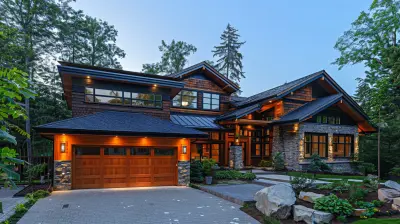Balancing Profitability and Tenant Satisfaction in Property Management
8 August 2025
Managing rental properties is like walking a tightrope. On one side, you've got the need for profitability—after all, real estate is an investment, and everyone wants a solid return. On the other side, there’s tenant satisfaction—happy tenants lead to lower vacancy rates and fewer headaches. But how do you balance the two without tipping over?
It’s a common struggle for landlords and property managers. Prioritizing one too much can mean sacrificing the other. If you’re too focused on profits, tenants may feel neglected and leave. If you over-prioritize tenant satisfaction, you might not make enough money to keep the business afloat.
So, how do you strike the perfect balance? Let’s break it down.

The Importance of Profitability in Property Management
At the end of the day, you’re in the real estate game to make money. Whether you’re managing a single property or an entire portfolio, profitability is key to sustaining and growing your investments.1. Covering Costs and Making a Profit
Owning a rental property isn’t just about collecting rent. There are mortgages, insurance, taxes, maintenance, and unexpected repairs that eat into your profits. If you’re not bringing in enough income, you won’t just lose money—you’ll struggle to keep the property in good shape, which, ironically, leads to unhappy tenants.2. Increasing Property Value Over Time
A profitable property isn't just about immediate cash flow. Smart investments in upgrades and regular maintenance can increase a property’s value over time. This allows you to charge higher rents, attract quality tenants, and ultimately boost your bottom line.3. Staying Competitive in the Market
If you're not making a profit, you're limiting your ability to reinvest in the property. This means your rental might fall behind in terms of modern amenities, making it less appealing compared to competitors. Profitability allows you to stay ahead by offering features that tenants actually want.
Why Tenant Satisfaction Matters Just as Much
While making money is important, the real foundation of a successful rental business is tenant satisfaction. Think of it this way—your tenants are your customers. If they’re unhappy, they’ll leave, and a high turnover rate can drain your profits faster than you think.1. Reducing Vacancy Rates
Every time a tenant moves out, you lose money. Finding a new tenant takes time and effort, and vacancies mean lost rent. Keeping tenants happy encourages long-term leases, ensuring a steady cash flow.2. Positive Word-of-Mouth and Referrals
Happy tenants are more likely to recommend your property to others. Whether it’s through online reviews or personal referrals, satisfied tenants can help attract high-quality renters without the need for expensive marketing.3. Fewer Maintenance Headaches
When tenants feel respected and valued, they’re more likely to take care of the property. This means fewer maintenance issues, lower repair costs, and a rental unit that stays in good condition for longer.
How to Balance Profitability with Tenant Satisfaction
Now that we see the importance of both sides, let’s get into the real challenge—balancing them effectively. Here are some strategies to keep both your profits and tenants happy:1. Set Fair and Competitive Rent Prices
Charging too much can drive tenants away, while charging too little can hurt your profitability. Research market rates in your area to ensure you're pricing fairly. If you offer excellent amenities, tenants will be willing to pay a bit more. But if your rent is higher than comparable properties, you may struggle to fill vacancies.2. Invest in Quality Maintenance and Repairs
One of the biggest complaints tenants have is slow or poor-quality maintenance. A well-maintained property keeps tenants happy and protects your investment. Fix issues quickly, invest in durable appliances, and ensure the property remains in top shape.3. Improve Communication and Responsiveness
Good communication can make or break tenant satisfaction. Respond to tenant concerns promptly, be transparent about expectations, and keep them informed about upcoming maintenance or changes. A little effort in communication can go a long way in maintaining good tenant relationships.4. Offer Incentives for Long-Term Leases
Encouraging long-term tenants saves you money on turnover costs. Consider offering small incentives like a slight rent discount for lease renewals, free professional cleaning before move-ins, or even small upgrades like smart thermostats or high-speed internet.5. Be Fair but Firm with Policies
Clear policies on rent payments, maintenance responsibilities, and noise complaints help set expectations. Consistency is key—treat all tenants fairly and enforce rules without bias, but also be understanding when life happens.6. Upgrade Wisely for Tenant Appeal
Adding amenities can enhance tenant satisfaction, but not all upgrades provide a good return on investment. Focus on cost-effective improvements like modern appliances, fresh paint, energy-efficient fixtures, or better security features. These upgrades make a difference without cutting too deeply into profits.7. Conduct Regular Tenant Satisfaction Surveys
Want to know how your tenants really feel? Ask them! Regular surveys can help identify small issues before they become big problems. This shows tenants that their opinions matter, making them more likely to stay long-term.
The Long-Term Benefits of a Balanced Approach
Balancing profitability and tenant satisfaction isn’t just about short-term gains—it’s about sustainability. When tenants feel valued, they stay longer. When properties are well-maintained, their value goes up.A happy tenant is more likely to pay rent on time, take care of the unit, and cooperate with management. In turn, landlords enjoy reduced vacancy rates, lower repair costs, and a stable source of income. It’s a win-win situation.
By focusing on both sides of the equation, you’re not just managing properties—you’re building a long-term, successful rental business.
Final Thoughts
At its core, property management isn’t just about numbers—it’s about people. If you treat your tenants well while also making smart financial decisions, you’ll find that profitability and tenant satisfaction don’t have to be at odds.It all comes down to balance. Keep your properties profitable, but don’t forget that a satisfied tenant is the key to long-term success. If you can find that equilibrium, you’ll build a thriving rental business that stands the test of time.
all images in this post were generated using AI tools
Category:
Property ManagementAuthor:

Travis Lozano
Discussion
rate this article
1 comments
Annette Long
Profitability and satisfaction coexist.
August 18, 2025 at 12:54 PM

Travis Lozano
Absolutely! Achieving a balance between profitability and tenant satisfaction is key to long-term success in property management. When tenants are happy, it often leads to higher retention rates and improved revenue.


